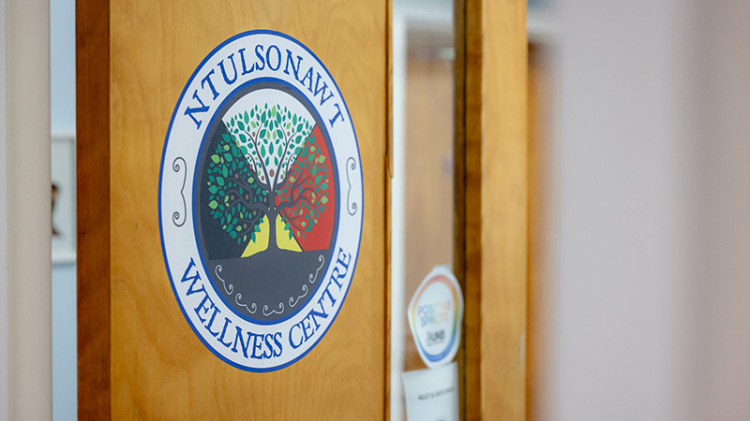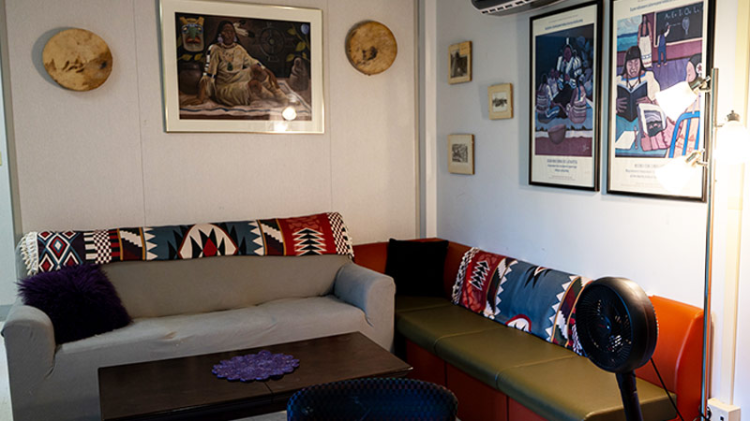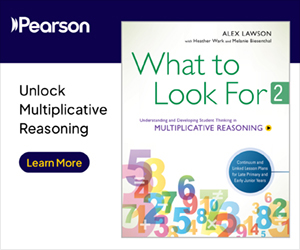Indigenous students arriving at the University of New Brunswick (UNB) face the challenge of leaving familiar communities, but the university's Mi'kmaq-Wolastoqey Centre (MWC) offers them a sense of belonging.

The MWC provides a space where students can find community, cultural connection and practical help navigating university life.
Nancy Harn (BBA'10, MEd'19), Indigenous wellness coordinator, first came to the MWC as a student in 2004.
"MWC was a home base for me. If there was anything I didn't understand, that's where I went."
Indigenous student advisor Alexander Miller (BScENR'24) shares that sense of belonging.
"We are trying to provide a home away from home to Indigenous students. We understand and we take it to heart, because it relates to our own lived experiences," he said.
'Bridging year' builds roots and cohorts
One of the MWC's cornerstone programs is the bridging year, renamed by the MWC's Council of Elders in 2022 as Wocopsqoltine Weci Spiqiyahtuweq in Wolastoqey and Weli'kwejik Elaqsultiek in Mi'kmaq, meaning, "growing from the roots, soaring together."
The eight-month program helps Indigenous students transition into full-time studies. It strengthens language, culture and tradition while building academic readiness. First-term courses prepare students for admission to their chosen program and second-term courses count toward their degree.
The MWC also offers the four-year Wabanaki bachelor of education program, which focuses on the languages and cultures of the Wabanaki Confederacy, of which the Wolastoqey and Mi'kmaw Nations are part.
Students complete most of the degree from home, except for land-based portions, and engage with Indigenous Elders and Knowledge Keepers. Half of the practicum involves teaching language in a community school.
Building community and connection

MWC staff understand the challenges Indigenous students face when leaving home.
"We provide them with a safe landing zone where they can get back some of that community feeling," said Miller.
Meaghan McIntyre (BA'13, MEd'25), Indigenous student success coordinator and career advisor, said the MWC helps Indigenous students bond.
"The MWC is a great place for students to connect with us, but it is also a great place where they can connect with each other."
Financial guidance and academic support
Financial stress is another common challenge. Miller spends much of his time helping students access bursaries, grants and scholarships.
"Tuition is often not as much of an issue as living expenses or additional requirements," he said. "I help students secure a few extra dollars for rent, food or other necessities."
The MWC also offers practical support, such as study spaces, tutoring and food. Online tutoring is available up to four hours per week, paid for directly by the MWC.
"The MWC provides access to the basic day-to-day needs, so students can feel secure enough to be themselves," said Miller.
Cultural identity and gatherings
Cultural identity is central to the MWC's approach. Harn said the MWC is inclusive of all First Nations, Inuit and Métis students.
"We can't paint everyone with the same brush, and we try to build upon their own Indigenous identity."
Every two weeks, students gather for cultural activities and shared meals.
"It is very relaxed," she said. "They can work on their own craft or cultural activity."
Wellness and career counselling
MWC also provides access to Indigenous counselling services through the Ntulsonawt Wellness Centre, located in room 342 of Marshall d'Avray Hall.
Named by Wolastoqey Elder Opolahsomuwehs (Dr. Imelda Perley (BA'94, MEd'02, DLitt'19)), Ntulsonawt means "one's personal path to strength and wellness."
"You are not doing anything that the student does not want to do. It is their journey. You are guiding them along that journey," said Harn.
Appointments are flexible and student-centred, and there is no penalty for missed appointments. Services are confidential, respectful and grounded in Indigenous culture. Virtual appointments are also available.
The MWC wants to meet students where they are at.
"We try to be there and meet the students where they are at, rather than asking them to fit into a rigid system," Harn said.
Harn and McIntyre are both certified counsellors. McIntyre is based in the Mawita'mk Lounge, room 336, a key gathering place for Indigenous students, and offers drop-in counselling, emotional support and career guidance.
"I help with the wellness workshops, but there is a lot of career counselling that I do," she said. "Planning what courses students need for certain career paths, helping them find part-time jobs or summer employment and helping new alumni get their first full-time job."
Harn provides Indigenous counselling services and helps students navigate appeals and accessibility services.
"I can submit letters of support on their behalf," she said. "We can get students registered with the Accessibility Centre I can refer them to the Centre and get them started so that there is no delay in the process."
MWC supports experiential learning and connects students with partners looking to hire or engage Indigenous students.
Students first and foremost
As the fall academic semester begins, MWC staff are ready to welcome Indigenous students with open arms and open minds.
"We recognize that students have lives outside the university, and we also liaise with the communities and potential funders. We try to meet the needs of the students through providing support," said Harn.
"We work together as a team to support Indigenous students. We talk often and we make sure the students are the priority. We have all been there, and we remember what it was like."













